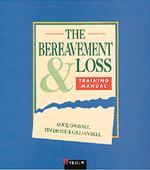 by Alice Goodall, Tim Drage & Gillian Bell
by Alice Goodall, Tim Drage & Gillian Bell
This resource outlines a comprehensive yet flexible program that can be used by both the professional trainer and the less experienced course leader.
Full Description:
Working with loss and grief must be recognized as an area which needs special attention and special training. This manual is designed for the course leader who wishes to promote the needs of bereaved people, and to help those professionals, voluntary groups and individuals who choose to work with them to develop their self-awareness, confidence and skills. The word 'bereavement' describes the experience of loss; the bereaved are those who have lost. Many people identify the word only with death, but throughout this manual it is used in relation to any type of emotional significant loss. The material included in the manual is specifically designed so that it can be taught not only by the experienced trainer, but also by course leaders who have had little experience. There is an emphasis on encouraging course participants to work with both their own experiences of loss and grief, and their subsequent coping mechanisms, to provide a basis on which to build their intervention with clients suffering a loss. Sample Activity Aim- To encourage participants to think about how they might enable clients to progress in the four
Tasks of Grieving
Materials- Paper from flip-chart; marker-pens; overhead of The Tasks of Grieving
Process- Check whether or not participants can remember the four Tasks of Grieving (pp56-61). Use flip-chart or overhead to remind them. Divide participants into four groups and assign one of the Tasks of Grieving to each group.
Ask them to consider:- In what ways people may avoid or get stuck in this task.
- How the counselor might encourage them to tackle this particular task:
- what areas might you want to try to explore?
- what sort of questions might be helpful?
- any particular techniques or exercises that might be helpful?
- what goals might you want to encourage the client to set for themselves?
- Any particular difficulties that might be anticipated.
- Give participants 20 minutes in their small groups to consider these questions, and then bring them all back together.
- Ask each small group in turn to feed back the results of their discussions. Give the rest of the participants the opportunity to comment or to ask questions. Find out if anyone has tried these sorts of strategies and, if so, how successful they were. If appropriate, give further ideas for possible strategies (pp 169-177).
237 pages in a 11 X 12 1/2, 4 ring binder; 30 laminated handouts; 20 overhead transparencies.
Section 1- Introduction: Using the manual and planning your course
Section 2- Designing your course
Section 3- Beginnings: Getting started
Section 4- Normal grief: Understanding our response to loss
Section 5- Complicated grief: Understanding the problems when grieving gets too difficult
Section 6- Essential counseling skills and working with normal grief:
- Reinforcing essential helping skills in relation to grief work
Section 7- Working with complicated grief: Developing further skills and techniques
Section 8- Support - Looking after yourself: Making further skills and techniques
Section 9- Endings: Helping poeple to leave your course
Stock- OUT OF PRINT - ONE COPY LEFT!
|